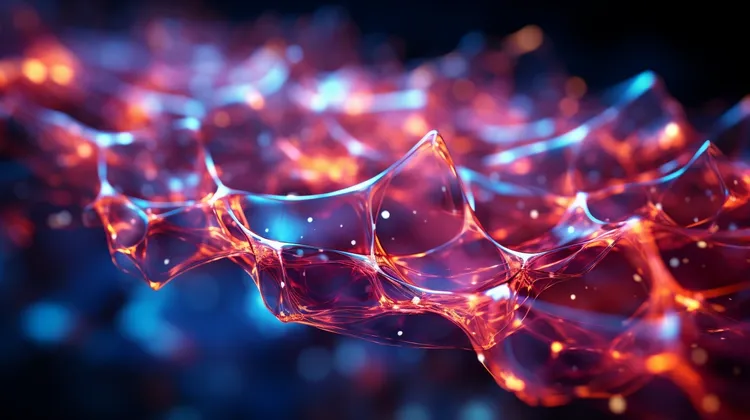
Revolutionizing Generative AI with a New Blockchain
The rapid advancements in artificial intelligence (AI) technology have unlocked numerous possibilities, particularly in the field of generative AI, where machines are capable of creating unique and original content. While the potential for generative AI is immense, there are inherent challenges that need to be addressed, including issues of ownership, copyright, and trust. This is where the integration of blockchain technology comes in as a potential solution, offering a new way to protect and authenticate generative AI creations.
Generative AI refers to the ability of machines to produce original output, such as artwork, music, or text, without any human intervention. This capability has gained significant attention in recent years, with AI-generated content gaining recognition in art exhibitions, music albums, and even news articles. The ownership and copyright of such creations can become complex, as it is unclear how to attribute ownership to an AI-generated work when there is no human creator.
Blockchain, most famously known for its association with cryptocurrencies, has the potential to revolutionize the way we handle ownership and attribution in generative AI. Developed as a decentralized and immutable ledger, blockchain can provide a secure and transparent record of ownership for AI-generated content. By using blockchain to store and verify the creation process, it becomes easier to prove the authenticity and originality of the work.
One of the key benefits of integrating blockchain with generative AI is the ability to establish a permanent and unalterable record of ownership. Every step of the AI creation process can be documented on the blockchain, ensuring transparency and eliminating any doubts regarding the work’s authenticity. This can be particularly important in the art world, where forgery and plagiarism are major concerns. Blockchain can provide a trusted system to protect artists’ rights and validate their AI-generated creations.
Blockchain can also enable new mechanisms for compensating creators. With a decentralized ledger recording ownership and usage rights, it becomes feasible to automate royalty payments and micropayments for specific usage of AI-generated content. This would empower artists and creators to monetize their work, even in cases where it is used by others for commercial purposes. Smart contracts on the blockchain can facilitate immediate and transparent compensation for the creators, ensuring a fair distribution of financial rewards.
Blockchain can address the issue of intellectual property rights within generative AI. With its decentralized nature, blockchain eliminates the need for intermediaries and central authorities, reducing the risk of content theft, unauthorized distribution, and plagiarism. This removes the reliance on traditional copyright systems, which may struggle to address ownership disputes arising from AI-generated content. By decentralizing the process, blockchain streamlines copyright issues and simplifies the process of establishing who owns the rights to AI-generated creations.
Despite the potential benefits, challenges still remain in implementing blockchain as a support system for generative AI. One of the significant concerns is the computational requirements and scalability. Blockchain networks can be slow and face scalability issues, especially when it comes to handling the vast amount of data produced by generative AI algorithms. Ongoing research and development in blockchain technology are making progress in addressing these challenges, paving the way for a more efficient blockchain infrastructure suitable for generative AI.
Another potential hurdle is the consensus mechanism required to ensure trust and integrity within the blockchain network. As generative AI relies on complex algorithms and machine learning models, it is essential to ensure that the AI creations are accurately recorded and verified on the blockchain. Developing a consensus mechanism that can handle the intricacies of AI-generated content could be a significant focus for future blockchain integration efforts.
The integration of blockchain technology has the potential to revolutionize ownership, copyright, and trust issues associated with generative AI. By leveraging blockchain’s decentralized and transparent nature, creators can establish permanent ownership records, protect their intellectual property rights, and automate compensation mechanisms. While challenges in scalability and consensus mechanisms need to be overcome, ongoing research and development in blockchain technology indicate a promising future for a new blockchain designed specifically to support generative AI. As AI continues to transform the creative landscape, harnessing the power of blockchain could be the key to a more transparent, fair, and authentic generative AI ecosystem.
6 thoughts on “Revolutionizing Generative AI with a New Blockchain”
Leave a Reply
You must be logged in to post a comment.
So now we have to rely on complex consensus mechanisms to ensure the authenticity of AI-generated content? This sounds like a disaster waiting to happen.
Blockchain’s ability to eliminate intermediaries and central authorities is so important in protecting against content theft, unauthorized distribution, and plagiarism. It’s a secure and decentralized solution for establishing ownership in the world of AI-generated creations.
Just what we need, more bureaucracy and red tape. Blockchain is not the answer to everything!
This is just a way for corporations to exploit AI-generated content without properly compensating the creators. It’s all about the money!
The idea of automating royalty payments and micropayments for AI-generated content through smart contracts on the blockchain is just brilliant! It gives artists more opportunities to monetize their work and ensures fair compensation.
Who even has the time and resources to implement this complicated blockchain integration? It’s not practical for most artists and creators.